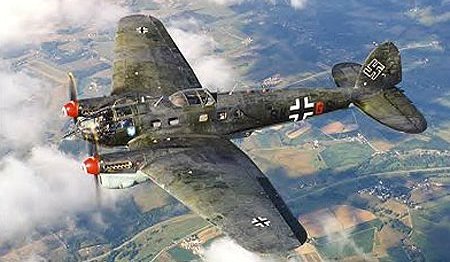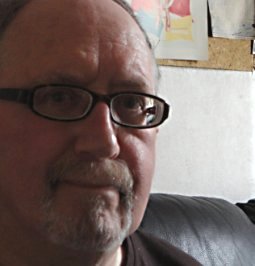

The June Editor's Pick Writer is Richard Hill
Please feel free to contact Richard at: richard.hill537@ntlworld.com

THE ROOM
by Richard Hill
During World War 2, in an attempt to bomb England into submission, Hitler’s Luftwaffe carried out massive air raids on the country’s major cities. The most concentrated series of air attacks on any British city area outside London during the war were on Liverpool and Merseyside which reached its peak with the seven nights of bombing from 1st to 7th of May 1941. Nearly one third of the houses in the City of Liverpool were damaged or destroyed.
“My name is Sally Jenkins and I must not die! My name is Sally Jenkins and I must not die!”
Sally felt the darkness surrounding her growing colder and harder to push away as she heard the screaming begin again.
She had to push back the darkness; to hold it back and not let it sweep her away. She had to stay alive, now that his mother was dead and his house destroyed. Frank would come home and she must be there, waiting for him.
She pushed the darkness away with the thought of Frank. She had been angry with him, for being called up, for his being sent to France, for being at Dunkirk and being taken prisoner. But now she only wanted to feel his arms around her, the warmth of his flesh against hers, taking away the cold which gripped her.
She wanted him to make the pain go away. She wanted her Frank, with his confident smile, always the one to cheer you up, to sort things out. Frank would find her a doctor, someone to help, someone to bring her something to drink. She was so thirsty. Every time she screamed her throat caught fire, burning like the City around her. If only Frank would come and take her away to somewhere safe and far away from the War. She wanted to go back to the country, to Wales, where they had spent their honeymoon, to be deep in the countryside, surrounded by silence and happiness. No one had been there to harm them, not the Army, not the bombs, not even Frank’s mother, Ellen.
Ellen had complained constantly. She would talk as if the War was Sally's fault, as if marrying her son had brought is all about; the War, the fact that her son was a P.O.W., and finally the bombing. At the shriek of the air raid siren she would always say the same thing.
“Oh God! Oh God! They’re back again. It never used to be like this. This is all wrong. I don't want to die!”
And then the woman who hated her would cling to her holding her tight.
They would crouch in the space beneath the stairs, their arms around each other, counting the screaming bombs as they fell.
Her mother-in-law would never go to the air raid shelter, despite Sally's pleas. As well as clinging to the hope that it would be safer in the shelter, Sally longed for the comfort and fellowship of others, the forced jokes and brave songs. But Ellen was too afraid to ever leave the house. Her husband had died of TB before the war. Frank had loved his father, who was strong and competent, a foreman at the docks. An exception to their matriarchal society, he had run the house and now that he had gone, Ellen was a lost child without him.
Someone must come soon! The A.R.P man had told her that a doctor would come to see her soon. He was a small, wiry man, his face black with soot, streaked with sweat. He had held her hand in the ambulance as the shrapnel rattled like hail on its roof. He smelled like the rest of the world, of fire and burning. When they reached chaos of the hospital she had screamed as he had eased her off the stretcher and onto a pile of blankets on the floor.
“I’m sorry, love,” he had said, his eyes flat with shock and exhaustion. “We need the stretcher, there's more to get out. There's no beds left, but they'll find you somewhere soon, I'll bet. You just hang on. Would you like a ciggy?” He had pulled the cigarette from his lips and offered it to her but she just shaken her head. The man had left and Sally had seen no one since.
Something had broken. Something was wrong. The bomb had deafened her, sucking the air from her lungs, throwing her across the hallway and then tossing the house on top of her. She had heard Ellen, wailing, like a stricken animal, and then her breath had come back to her in a choking rush. Retching and coughing, it took her a moment to realise that she was pinned under Ellen, the other woman's blood a warm shower soaking her legs. And then, what seemed like hours later, came the realisation that they were both trapped under something hard and heavy lying on top of them and across Sally’s legs; a mountain of bricks and beams, as she lay there listening to the aircraft droning overhead and the crump of falling bombs and the crashing of the guns went on and on.
When the raid had begun she had been queuing at the grocer's, clutching her ration book and her string bag, dreading Ellen’s whining complaints if they ran out of cheese before she reached the front of the queue. The women around her were talking about last night’s raid, and the destruction of the local pub, the Green Man. A short, loud woman, standing behind Sally, was recounting with relish how the drinkers in the pub had rushed to its cellar for shelter.
“Incendiary bombs! They set the whole place ablaze; it just fell on top of them. Trapped in the cellar they was! Trapped and burned alive!”
Sally had bought their tiny ration of cheese and was hurrying back home through the darkening streets when the warning sirens began their high-pitched wail. Ellen had been waiting for in the doorway of her house, pulling her indoors, the familiar mantra her only greeting.
“They’re back again! Oh God! They’re back again!”
But this time they had come for Ellen and her home.
Sally had lain beneath it, coughing, her mouth too dry and choked with blood to call for help, as she lay trapped and waiting for the crackle of the flame which would burn her alive, like the drinkers in the Green Man, Then, suddenly, she could hear again, her own voice, screaming now, and then she heard voices nearby and the feel of frantic hands around as they pulled her free, and then the pain had moved into her body and her screams had taken her.
“My name is Sally and someone will come soon. I mustn't die! I must not die!”
As the pain ripped through her body she heard her scream again, not coming from her dry and empty mouth, but connecting with all the terror and pain, joining her to all the pain in the world, flowing into and out of her in one never-ending howl.
She could hear voices, from somewhere outside the darkness surrounding her; and laughter and sometimes, snatches of conversation, music which she sometimes recognised, but which was mostly strange, crude and brash and with it the sound of life now not with her but around her. She screamed as loudly as she could to push through to the voices and out of the darkness.
“I’m here, in this room. I'm hurt. In the raid. Last night. They left me here because the wards are all full. Get me a doctor, please! My name is Sally Jenkins and I will not die!”
*****
Angie led Tricia along the corridor back towards the Nurse’s Station. The tour of the Unit had gone better than she had expected, and the new nurse looked as if she would fit in with the rest of them. It was important that they should get on well together and Tricia seemed friendly and keen; but thankfully not too keen. When Angie had read her file she knew that Tricia had been a nurse long enough to know how hard it was to do a good job in the face of all the financial cuts and the endless paperwork, and yet still keep positive
“That’s about it I suppose. Another emergency exit down there and this is where we keep the towels and linen.”
Angie jerked open a door and flicked on the light, revealing a small, narrow room, lined with packed shelves.
Tricia peered into the room and stepped inside. “Is this is the room I've heard about, the haunted room?” She smiled nervously at Angie, not sure of her response, relieved when the other nurse smiled back.
“The haunted room?” Angie said. “They used to call it the Screaming Room when I first came here.”
“They still do. They say that someone, and nurse, was murdered there years ago, and that at night you can sometimes hear her screaming and calling out for help.”
Angie stepped back into the corridor and, as Tricia followed her, closed the door and turned to face her. “Sorry to disappoint you,” Angie said, “but there's never been a nurse murdered here; although when you've met Dr Ferris you’ll wonder why some doctors aren't. A real cow, that one.”
“So the room isn't haunted?” Tricia looked half relieved, half disappointed as
Angie leaned back against the wall, longing to take the weight off her feet, for a cup of tea in the nurse’s room.
“People claim to hear these faint screams, as if they're far away, but I've never heard anything,” Angie said. “If you ask me, it's nothing but the wind, whistling through the window or something. Anyway, if any place were to be haunted, it would be by someone who died here, and that would be in one of the wards, wouldn't it, not here, and no one would ever put a patient in the storage room. Not yet anyway, but if they keep closing down wards… Anyway, forget about haunted rooms. There's enough real stuff here to worry about. And for God's sake, don't ever mention ghosts to the patients. Being buzzed all night by people who think they can hear a ghost screaming is all we need. Right, time to dole out some non-recreational drugs.”
As Angie strode off down the corridor, Tricia paused for a moment.
There it was again: faint, like a fly buzzing, just a small vibration in her ear. It seemed to be coming from behind the closed door of the room...the echo of something far away, growing fainter as she hurried away in pursuit of Angie.
A widely published poet, Richard Hill has also written for radio, TV and the theatre, and magazines, as well as playing in assorted bands in and around Liverpool for as long as he can remember. Richard has an MA in Victorian Literature from the University of Liverpool where, until his early retirement due to ill health, he headed up their Editorial Office as well as teaching Creative Writing there. Until his illness he had never written horror fiction, but since going over to the dark side of literature he has been published in a number of horror magazines, his favourite being The Horror Zine.